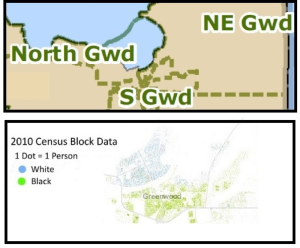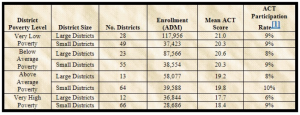Gerrymandering Makes Many Officials Untouchable
2016/04/08 – Last month, State Rep. Karl Oliver offered a galling example of how protected Mississippi legislators are and how broken state-level democracy remains to this day.
Gulfport resident Becky Guidry sent emails to House members in March urging them to reject a new corporate-friendly bill that would cut more than $570 million in state revenue because the state already was in a $65 million budget shortfall – due, in part, to even more recent tax cuts.
Oliver, a Republican, responded to Guidry in an email, pointing out that she has not always lived in Mississippi and should go back to where she came from.
“I see you are not a native to the great state of Mississippi nor do you and I have similar political views,” wrote Oliver, who owns a funeral home in Winona, MS. “… I appreciate you going to the trouble to share yours with me, but quite frankly, and with all due respect, I could care less. I would, however, recommend that there are a rather large number of like-minded citizens in Illinois that would love to see you return.”
Olivers’ cohorts in the House, rather than chide or censure him for his insensitivity, merely snickered. Twitter account #FedUpWith50th reported that Rep. Jeff Smith, another Republican, “wanted to congratulate and recognize the junior gentleman from Winona on making national headlines, and his notoriety. We’re so proud of him.”
However self-incriminating state politicians like Oliver act, many are shielded from consequences by undemocratic politics.
“Legislators in this state have a long history of ignoring voters, whether it’s black voters who were utterly removed from the democratic process by disfranchisement, despite comprising a large percentage of the state, or poor voters who can’t afford to buy their representative’s ear,” said MSNAACP President Derrick Johnson.
The MSNAACP has already discussed how unethical gerrymandering by both Republican leaders and black Democrats has successfully insulated many incumbents from replacement in a fair election.
Oliver’s District 46, for example, was similarly carved up by legislators in 2012 to exclude black residents living in the city of Greenwood, who typically vote Democratic. The top map below outlines Oliver’s district in blue, while the dot representation offered by the map beneath it reveals just how much of that area is comprised of white voters.
Answer: all of it.
Fighting the injustice of gerrymandering is difficult because the gerrymandered districts also draw support from the opposite side of the political aisle, from Democratic members of redistricting committees. It turns out that many black Democrats are also insulated from political upset because of the higher percentage of black voters the gerrymandered districts give them and, as a result, offer little complaint when the maps are submitted for approval. Rep. Willie Perkins, Sr., for example, represents District 32, which contains the south Greenwood black population cast off from Oliver’s district. The arrangement gives Perkins a district that is 80.58 percent black and virtually assures his re-election.
The state House has 42 majority-black districts out of a total of 122, but a large percentage of those black districts are more than 65 percent black. Some, like District 69, are as high as 86 percent black, representing clear evidence of voter “packing,” which reduces black political influence in surrounding districts.
Legislators are protected by more than just friendly election maps created by their buddies in the legislature, however. Many of the lawmakers at the state Capitol are financially dependent upon out-of-state lobbyists to fund their campaigns, rather than individual Mississippi voters.
Oliver, for example, received $750 from oil and gas lobbyists Koch Industries and $500 from payday loan company Tower Loan in 2014. In 2015 he received $1,000 from Empower PAC, among many other business-related contributors.
Source: MS NAACP






